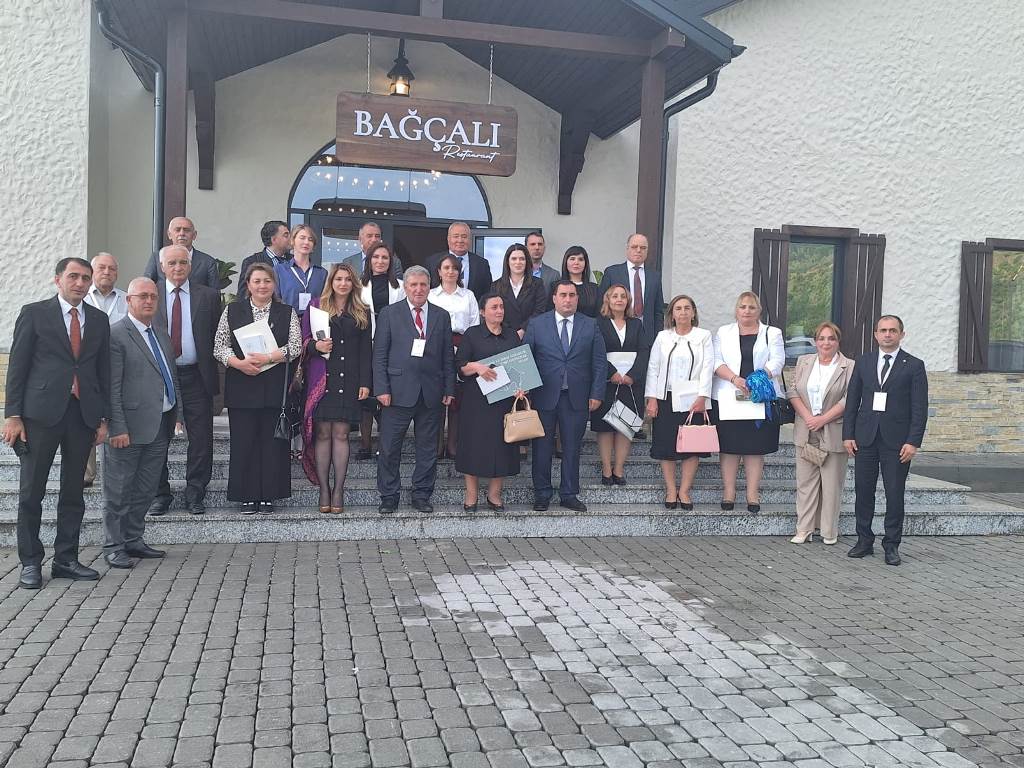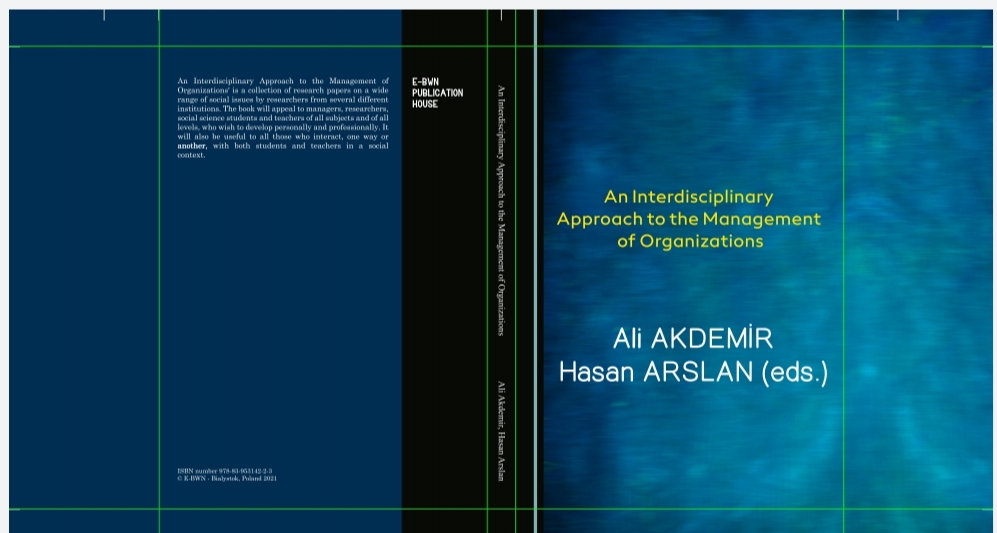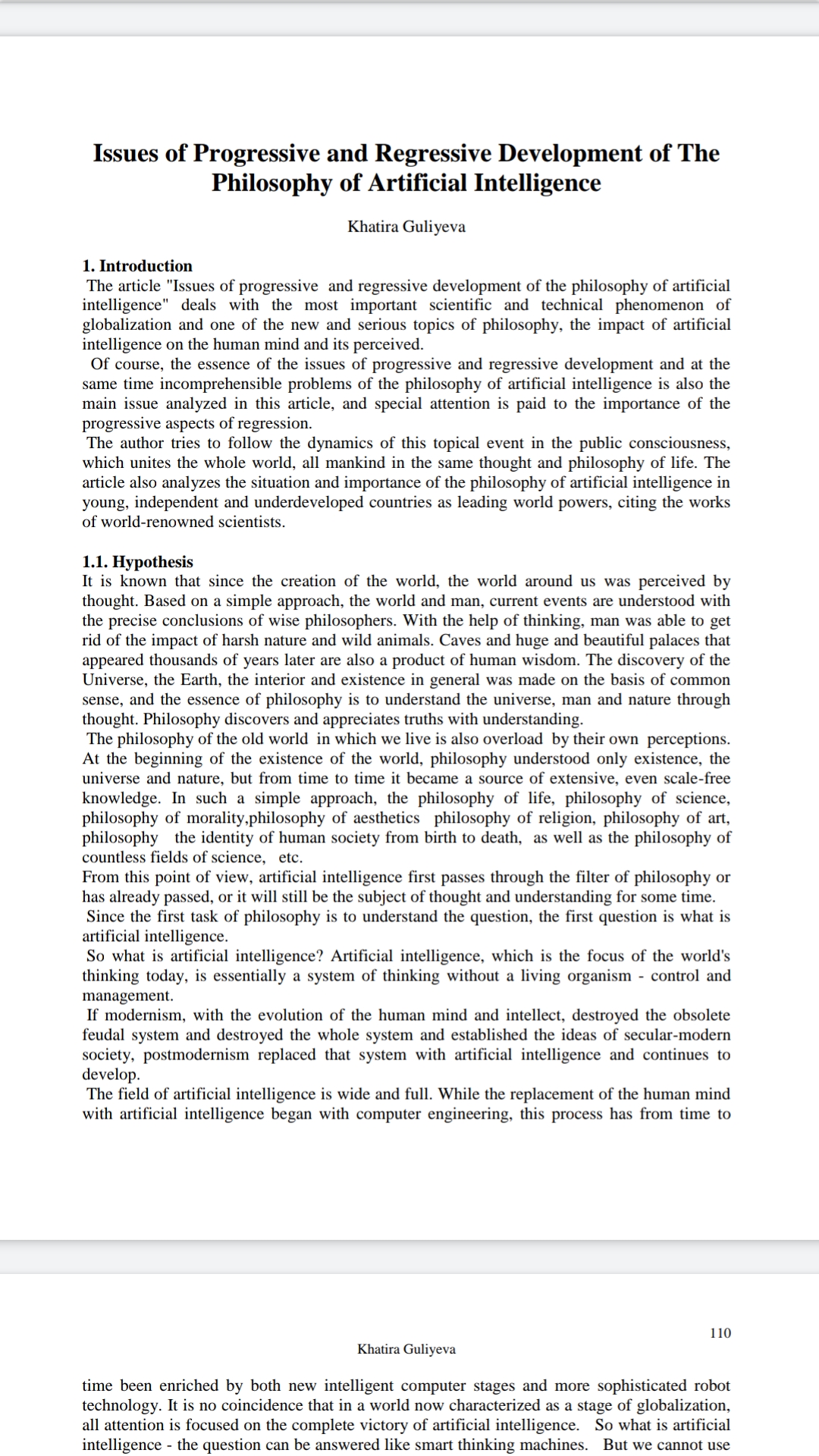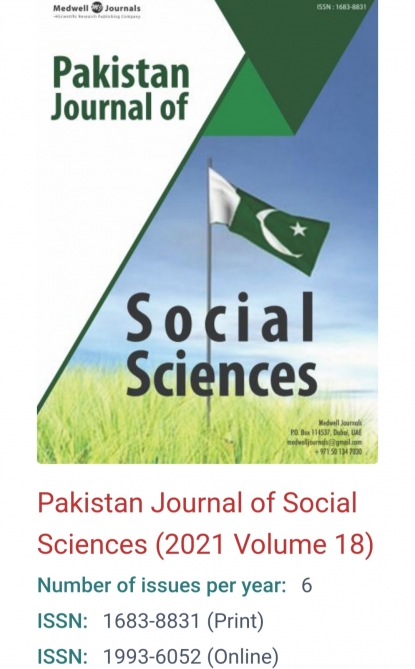- A-
- A
- A+
Issues of Progressive and Regressive Development of The Philosophy of Artificial Intelligence

Summary
The article "Issues of progressive and regressive development of the philosophy of artificial intelligence" deals with the most important scientific and technical phenomenon of globalization and one of the new and serious topics of philosophy, the impact of artificial intelligence on the human mind and its perceived.
Of course, the essence of the issues of progressive and regressive development and at the same time incomprehensible problems of the philosophy of artificial intelligence is also the main issue analyzed in this article, and special attention is paid to the importance of the progressive aspects of regression.
The author tries to follow the dynamics of this topical event in the public consciousness, which unites the whole world, all mankind in the same thought and philosophy of life. The article also analyzes the situation and importance of the philosophy of artificial intelligence in young, and underdeveloped countries as leading world powers, citing the works of world-renowned scientists.
1. Introduction
It is known that since the creation of the world, the world around us was perceived by thought. Based on a simple approach, the world and man, current events are understood with the precise conclusions of wise philosophers. With the help of thinking, man was able to get rid of the impact of harsh nature and wild animals. Caves and huge and beautiful palaces that appeared thousands of years later are also a product of human wisdom. The discovery of the Universe, the Earth, the interior and existence in general was made on the basis of common sense, and the essence of philosophy is to understand the universe, man and nature through thought. Philosophy discovers and appreciates truths with understanding.
The philosophy of the old world in which we live is also overload by their own perceptions. At the beginning of the existence of the world, philosophy understood only existence, the universe and nature, but from time to time it became a source of extensive, even scale-free knowledge. In such a simple approach, the philosophy of life, philosophy of science, philosophy of morality,philosophy of aesthetics philosophy of religion, philosophy of art, philosophy the identity of human society from birth to death, as well as the philosophy of countless fields of science, etc.
From this point of view, artificial intelligence first passes through the filter of philosophy or has already passed, or it will still be the subject of thought and understanding for some time.
Since the first task of philosophy is to understand the question, the first question is what is artificial intelligence.
So what is artificial intelligence? Artificial intelligence, which is the focus of the world's thinking today, is essentially a system of thinking without a living organism - control and management.
If modernism, with the evolution of the human mind and intellect, destroyed the obsolete feudal system and destroyed the whole system and established the ideas of secular-modern society, postmodernism replaced that system with artificial intelligence and continues to develop.
The field of artificial intelligence is wide and full. While the replacement of the human mind with artificial intelligence began with computer engineering, this process has from time to time been enriched by both new intelligent computer stages and more sophisticated robot technology. It is no coincidence that in a world now characterized as a stage of globalization, all attention is focused on the complete victory of artificial intelligence. So what is artificial intelligence - the question can be answered like smart thinking machines. But we cannot use the expression: a car is as sensitive as a real person. But can machines replace a man who has been tried and accepted wisely by the masses of artificially intelligent creatures? If he can give the first answer, the one who thinks deeply will answer "no". Because as time goes on, creativity requires innovation, and also the consciousness of machines cannot be equated with the imagination of the creative individual.
If we compare the intellect of the most perfect man with the most powerful computer, the former still has the advantage, because the creator of the latter is again a perfect man. We all know the saying, "His brain works like a machine," for intelligent people. But we cannot use the expression: a car is as sensitive as a real person.
Regardless of the field of science, the power to create is characteristic. It is based on innovation. However, no matter how synthetic the information of a computer's memory, it is not as vast as the archive of human consciousness, nor does it have the quality of "impermanence".
To give such a simple example, let's take the sensitive buttons of a computer to "create" with a person who is in good health and in good spirits for creativity. This person can think tirelessly for hours during the day. However, a smart car, a computer must "rest" after a certain hour. The latter's creativity can also be hampered by a power outage or internet connection, but once a person begins to create for the creator, these strokes cannot be an obstacle.
From this point of view, artificial intelligence cannot create the "miracles" that man creates with his natural intellect and in any field.The machine does not think, its mind is simply to present the information of its choice in the directions determined by the person as an exhibition. He can also say that smart cars, like guides, only have the function of showing. Smart machines do not take on the task of analyzing and drawing conclusions.
Psychological approaches and predictions of an intelligent person cannot be replaced even by machines "loaded" with the strongest logical syllogisms. If the issue is still assessed by the criteria of nationality and identity, no intelligent machine will be able to replace the national creative person. That is, no matter what or what subject can be modeled, it seems impossible to find a smart machine button that can replace a smart person in the indices of ethnogenesis and ethnopsychology.
Thus, in this article, we have tried to follow and scientifically and objectively evaluate the progressive and at the same time regressive development of the Artificial Intelligence system of the new World Order program of the Globalization phase, which covers all areas.
1.1. Hypothesis And Methodology
Artificial intelligence, which is an important progress in the process of understanding the world, one of the serious issues of the multidisciplinary system that forms the basis of modern science, especially mathematics, logic, physiology, neurophysiology, psychology, cognition, epistemology, philosophy. It is impossible to understand and imagine artificial intelligence methodology without the theory of these sciences and without philosophical analysis and evaluation, as it is about consciousness. For many years, these two sciences - artificial intelligence and philosophy - created a new and comprehensive multidisciplinary methodology with the influences of epistemology and qneseologiya. Of course, no matter how old the history and methodology of philosophy, the methodology of the artificial intelligence system has been developing specifically since 1936. The artificial intelligence system, based on the work of British mathematician and logician Alan Turing, has been successfully observed both theoretically and experimentally for 85 years. Practice without methodology, methodology without experience is impossible. From this point of view, the evaluation of new theoretical topics in the context of scientific multidisciplinary research of intelligent machine systems has accelerated the development of this scientific philosophy of artificial intelligence and its methodology. Their assessment determines the development of artificial intelligence scientific philosophy and methodology.
Based on this, we can say that A. Turing gave the world thinking the methodology of "smart" computers in the face of millions of human questions. This was the revolutionary progress of the new civilization. At the same time, artificial intelligence has brought about the collapse of modernism, which is based on the enormous potential of the human mind and its practical activity.
Artificial intelligence has evolved from simple intelligent machines to computers with a wide range of capabilities, to the level of progress in the field of robot technique. At present, the science of artificial intelligence is experiencing such a strong postmodernist leap that the world's surrender to the power of artificial intelligence and its replacement by man is very thought-provoking. From smart computers to smart cities, the phenomenon of millions of artificial controls is rapidly making its way into the future.
It is not excluded that in this history there are problems of a regressive nature, as well as progressive. Most importantly, the two interdependent phenomena of the - progress and regress - are related to Humanity.
Here, the line of progress and regress development itself is of interest as a theory and methodology. It should be noted that in the past centuries, mechanical machines were a great scientific and progressive development of the time, and the failure of mankind to master this progress en masse, as well as the weak dynamics of the widespread application of the achievement to production, was tantamount to regression. Rapid advancement of mental intelligence on the one hand and backwardness on the other. Computers and robotics - the generation of intelligent machines is ideal, that is, the progress of development. In terms of intelligence, its opposite - the obsolescence of form and content - is assessed as an indicator of the level of regression. The progressive and regressive essence of the development of artificial intelligence is the dialectic of its philosophy, which has followed this phenomenon throughout history, and it is an ongoing phenomenon. By studying the historical stages of artificial intelligence, it is possible to assess the progress and development of regression.
Thus, the second interest of philosophical thought is the analogy of artificial intelligence, and here the history of the progressive and regressive effects of development is of great importance.
2.1 The analogy of the field of artificial intelligence
First of all, it should be noted that the analogy of artificial intelligence, like all dialectical and metaphysical, is based on antiquity.
Artificial intelligence preceded not only the invention of electronic engineering, computers or robots, but also simple mechanical large and complex machines, and in general, the substitution of artificial intelligence for human intelligence is of interest.
Historical sources in all fields lead researchers to myths and ancient Greek philosophy. First of all, it should be noted that the traces of artificial intelligence in myths not only determine the history of the phenomenon, but also expand its field of interdisciplinary research with the sciences of mythology, anthropology, ethnography, ethnogenesis.
Thus, the first robot created by Zeus and named Talos with bronze wings from ancient Greek legends can be regarded as the "father" of modern artificial intelligence robots. One of the main features of this human-like robot is explained by the insertion of a tube of molten steel that flows from shoulder to foot into its "body". Tolos, like modern electronic robots, had features such as sharp speed and stone throwing to replace humans.
Therefore, as the sources state, "Talos is a bronze legendary giant, the first robot in history to protect the Minoan Griti from invasions"( Талос - бронзовый мифический великан. https://www. grekomania.r u /articles/ 114-talos).
Interestingly, although Tolos had a different defensive power than humans, Minoan could not defend Griti for long and exploded in an enemy attack. The legendary imagination describes the sounds the Talos robot makes when it explodes as its laughter and emphasizes that the term "ardonic laughter" comes from here.
Adrienne Mayor, a researcher at the School of Classical Sciences at Stanford University, focuses on myths about the artificial female robot Pandora, like Tolos. The first subjects of artificial intelligence, robots and self-propelled objects were found in BC. It appears in the works of the ancient Greek poets Hesiod and Homer, who lived between 750-650 BC. Concluding that the 700-year-old Talos legend is the oldest example of a robot, the researcher said, “Historians often date the idea of the machine to the Middle Ages, when the first self-propelled devices were invented, but the concept of Artificial, living being at least 2,700. . Myths are the subject of Old Machine and Technology Dreams. Our ability to imagine artificial intelligence goes back a long way. The idea of creating artificial life and robots was explored in ancient myths long before technological advances made self-propelled devices possible"( Earliest Fascinating Concepts Of Artificial Intelligence And Robots In Ancient Myths – Examined https:// www .ancientpa ges.com/ 2019/ 03/06/earliest-fascinating-concepts-of-artificial-intelligence-and-robots-in-ancient-myths-examined/).
Researcher Adrienne Mayor also analyzes the ancient world's Pandore myth and calls it an artificial intelligence agent. This idea is the original interpretation and the agent can be thought of as a signal of dialogue with the modern world in the human subconscious system.
An interesting topic here is confirmed by the fact that the myths and legends of the ancient world created a rich library of science fiction and science fiction works in the history of the development of artificial intelligence. Similarly, in these studies, artificial intelligence covers the past and future of the world, and the solution of human needs, large and small, with the effect of involuntary forces.
Karel Chapek's "Intelligent Universal Robots", Arthur C. Clarke's "The City and the Stars", "Press the Button for Frankenstein," E van Vogt's "The World of Moment," Robert A. Heinlein's "The Moon is a Tough Mistress," and Dan Simmons' Hyperion Songs, "Angels and Spaceships", "I'm a robot", "Two-year-old", "Cyber", "2001: Space Adventure" and many more is an artificial intelligence onology.
In these works, the fantastic transformation of the computer into a human being actually predicted that in the future, intelligent machines would replace human activity.
As time went on, the development of science fiction also contributed to the development of screen art and played an important role in the worldview as a whole.
Like myths, written literary and philosophical works of antiquity had similar definitions confirming the existence and possibility of artificial intelligence. However, during the Enlightenment period, there was a serious scientific interest in the main fields of artificial intelligence, especially in Europe, which was the cradle of modernism.
R. Descartes, T. Hobbs, Blaise Pascal and Leibniz and later Charles Babbage and Ada Lovelace, Bertrand Russell and Whitehead, Conrad Tsuze, Warren McCullough and Walter Pitts and others enriched the field with valuable scientific innovations.
Although the research of these scientists was based on the analysis of mechanical materialism in humans and living organisms in general, they revealed the possibilities of the mind and produced experimental examples of this.
In this regard, the beginnings of artificial intelligence super digital computers are analog systems such as nomogram, slide rule, astrolabe, oscilloscope, television, analog sound processor, autopilot, as well as acabus. Therefore, the analogous field of artificial intelligence is strong and wide, as well as sustainable.
2.2. An organic, characteristic law
Cognitive science, an interdisciplinary field of study, sees the development of representative artificial intelligence from legends to fantastic written sources and its continuation to mechanical engineering as a an organic, characteristic law and does not exclude contradictions.
From this point of view, artificial intelligence is a science and has a history of its origin and development, no matter how many similar experiments form the basis of the modern intelligence management system. Digital, a very important scientific innovation of its time, is now being pushed into the background compared to thinking, intelligent machines. In fact, they are not worn out yet. But Machines, where all the possibilities of modern Intellect are focused, are beginning to replace them better. Artificial intelligence machines try to mimic even the most complex tasks, such as language, emotion, ordered landscapes, images. Artificial intelligence - smart machines are even able to replace cities and large institutions.
Thus, we can say that in a short time, an artificial mechanism capable of replacing a person in any field could not become a scientific methodology full of content and essence. The reality is that such experiments confirm that the world's scientific thought has undergone a long and complex quest and change, ranging from revolutionary artificial intelligence to consciousness and technology.
Observations also show that the progressive and regressive effects of the technique in the world of artificial intelligence are developing an organic, characteristic at the same rate. On the one hand, successful technology or electronics, created by the development of a strong intellect, on the other hand, the higher existence of the world, pushing man into the background, rejection of labor and physical strength. In this controversial development as a whole, the importance of human existence is reduced to zero. It is even argued that artificial intelligence will take over the world from humans and become the dominant force.
There are a number of important examples of an organic, characteristic law in the progressive nature of artificial intelligence. For example, artificial intelligence primarily includes the revolutionary evolution of the century of science - the progress of civilization. On an interdisciplinary level, he writes his story, penetrating almost every field of science. Secondly, artificial intelligence is useful for the state, the simplest example is cost reduction by limiting labor in all areas, and thirdly, artificial intelligence is the inexhaustible material and spiritual interest of people. A person expands his intelligence with a computer or smartphone, satisfies his desires for music, video, games, entertainment, shopping, as well as artificial intelligence products with robots for housework, automated services, etc. As we mentioned above , the transition to virtual worlds with computers or phones, which is a branch of artificial intelligence, is also human.
But as soon as "smart buttons" become inaccessible to a person, he himself becomes useless. This is the most inevitable mask of creative artificial intelligence, where sources and its continuation antiquity manifests itself.
Thus, subjective approaches, unlike those that value and defend artificial intelligence, insist that it cannot rule the world. In our opinion, the current regression effects in the process of artificial intelligence are undeniable, although stable and even rapid dynamics are observed in the line of an organic, characteristic law progressive development. This is the most realistic view of the artificial intelligence system and the an organic, characteristic law technique of the worldv.
2.1.Questionnaire on artificial intelligence in the USA, China, Great Britain
It is no coincidence that in this part of the article we want to observe the development of artificial intelligence in the United Kingdom before the United States and China. This is due to the fact that the system of artificial intelligence has opened the way to world thinking from England, and now the UK occupies the first place in Europe for the development of systemic intelligence. In our opinion, it is necessary to briefly recall the unique services of the English mathematician and logician Alan Turig, whose name is synonymous with the history of artificial intelligence, in the development of computer science. Thus, at the age of 24, in 1936, Alan Turig published a book entitled "On Computable Numbers, with an Application to the Entscheidungsproblem". In this work, he introduced the new idea of "Turing machine", which is considered the "father" of modern universal computers, which took the science of computer science with a powerful leap and forever engraved its name in the world scientific thought.
With a thorough education in mathematics and cryptology, Turing's life included working at Cypher School, a government code-breaking organization, as well as being a leading participant in wartime code-breaking, and five major advances in cryptanalysis used to decipher German Enigma cipher signals. It is also important to write two works, "Code" and "Super School".
A. Turing's scientific activity in the 1940s attracted greater success. He started working at the National Physical Laboratory in London, overseeing the design of the Automatic Computing Engine, and in recent years, in nearly 70 years, has brought the world's first widely used personal, shop computers to the market.
In the late 1940s, this unique intellectual, who held senior positions in mathematics and computation, substantiated and proposed the subject of artificial intelligence specifically in his valuable works known in 1950 as "Computing and Intelligence" and the "Turing Test."
Alan Turing's "Chemical Foundations of Morphogenesis", published in 1952, has a special place in his scientific legacy. It is that Alan Turing made great scientific achievements in 1950-1952, but after an accident in 1952, he met the bitter end of his life and died mysteriously in 1954.
The works of the great scientist were published in large numbers 40 years after his death, and for 28 years the world has benefited widely from A. Turing's artificial intelligence system, and a generation of scientists following his path is developing scientific experiments with their innovations.
Currently, the UK ranks first in Europe in terms of AI development. In the UK, which ranks third in the world after the United States and China, AI is widely used to increase the efficiency and development of digital services, land use using satellite photography, and so on.The UK, along with Canada and Israel, plays a key role in the evolving AI ecosystem. In April 2018, the government released a strategy document on artificial intelligence, stating that an artificial council in the industry would be established in collaboration with academics. The council will lead the development of AI, oversee the implementation of state policy in this area, promote industry and advise the Government on artificial intelligence. In addition, the government will set up an AI unit to work with the council, which will promote the implementation of a national strategy in this area and co-operate with other governments.
Of course, the United States is one of the top three countries in the world that embraces and uses the field of artificial intelligence, which is considered the father of Thuringia. In fact, the role of artificial intelligence in the economic and military development of the United States is enormous. This can be confirmed with a very exclusive look.
For example, according to an Internet summary, the current level of artificial intelligence in the United States is as follows: “1. The development of AI in the United States is estimated at 33% (100%) of the total level of development of AI in the world. 2. Leading the Third Defense Innovation Initiative in military AI technologies is a key goal of the United States. 3. The Interim National Security Commission on AI was established (March 2018). 4. An interdepartmental body has been set up to review advances in AI technology, and Commissioners have been appointed Secretary of Commerce, Secretary of Defense, and chair of various committees in the US Congress. 5. Numerous structures of the military and intelligence community are involved in military AI research activities, including the Defense Advanced Research Projects Agency (DARPA), the Air Force Research Laboratory (AFOSR), the Army Research Laboratory (ARL), and the Behavioral Institute. 6. A Joint AI Center was established to unite the efforts of the national military community on developments in the field of AI. For the coordination of military programs alone, $ 1.7 billion has been allocated to AI use departments over six years. 7. More than 600 programs of the US Department of Defense cover the use of AI technologies. 8. The Maven Project is the most important and successful project in the US Department of Defense. Implemented by the "Algorithmic War" section. The aim of the project is to move from a one-time effort to the use of artificial intelligence in the armed forces to the sustainability of this process. The frequency of available innovations is every three months. 9. The 2019 U.S. National Defense Budget Act completely prohibits the U.S. military from using "non-traditional technologies," including AI, as well as online translators, unmanned vehicles, cancer detection systems, satellite imagery analysis, and includes cyber defense organizations that are available to everyone” (Развитие искусственного интеллекта в странах мира: США, Китай, Великобритания).
In the People's Republic of China, one of the three largest countries in the world in East Asia, the field of artificial intelligence continues to develop with great success. It is governed by public administration, industry, commerce, military, economic, public and judicial services, medical care, security, and artificial intelligence capabilities. Analysts estimate the overall AI growth rate in China at 17 percent. In this regard, China ranks second after the United States. State-level funds have been created for the development of artificial intelligence; In the largest IT companies, the state creates "party committees" and purchases "management packs" to increase control over the implementation of government duties in the business and scientific community. The state established "party committees" in the largest IT companies and purchased shares - "management packs" to strengthen control over the performance of government functions in business and science; China's central government selects the best performing companies and helps them develop national AI innovation platforms; Priorities have been set for the development of AI at the state level; After studying at leading universities and working in leading companies in the AI field, it implements highly effective programs that attract AI professionals from abroad and enable SI leaders to return to their home countries (Развитие искусственного интеллекта в странах мира: США, Китай, Великобритания).
In terms of artificial intelligence, Canada, India, Israel, France, Germany, Sweden and Spain are in the top 10 after these three countries.
Regression is no exception, as is progressive development in the United States, China, and the United Kingdom, which we selected for artificial intelligence research. From this point of view, it would be appropriate to address the problems that are indicative of decline in all three countries.
Thus, the "competition that threatens China's absolute leadership in artificial intelligence," which is characterized as a weakness of artificial intelligence in the United States, The possible negative consequences of AI are also regression: the emergence of an uncontrolled use of technologies of the Fourth Industrial Revolution in military operations, which are poorly covered by international law; AI-powered military developments pose an existing threat to human life; Under weak, traditional valuation methods, states and non-state actors will be able to deliver high-precision strikes from a distance against strong states; AI will automate cyberattacks and introduce this technology to the black market; "Algorithmic discrimination" between users or groups of citizens due to individual preferences of programmers and incorrect information processed by AI systems; One-third of US men between the ages of 25 and 54 will lose their jobs at the end of this half-century because of AI (Развитие искусственного интеллекта в странах мира: США, Китай, Великобритания)
Regression problems have also been reported in China. In China, this is defined as “machine learning and implementation of information lagging behind the United States in three areas of AI (machine learning and implementation of AI algorithms, research and development of AI algorithms, and equipment for building commercial AI ecosystems).
Britain, the third world leader in SI, is also a significant weakness in the "brain drain" compared to the United States and China. Exit from the EU, Rising Unemployment Rate, Systemic Changes in the Structure of the Labor Market ”are serious regressive consequences.
2. Results
As a result, the world is advancing rapidly in the field of artificial intelligence and robotics on the one hand, and all countries are trying to join this progressive wave in this direction. On the other hand, parallel to the progress, there are problems of a global regression nature. Even those that were recently recognized and appreciated as AI advances have now become the "red line", which is a sign of a declining situation.
Thus, in the modern world where artificial intelligence is inevitable, the parallel development of progress and regression is also philosophically subjective objective.
But man is an eternal being, and it seems impossible for artificial intelligence to completely replace him. Here, the development of artificial intelligence is unequal in the example of the integration of 195 countries of the world. Even the most developed countries are at such a competitive level. This represents an ongoing regression, and the faster the improvement, the stronger the regression. Rather, there are countless "intelligences" - convincing scientific evidence that a logical, living person's intelligence is superior to an artificial intelligence system. Artificial intelligence, for example, needs 3 million words for the author of this article to speak only in their native - Azerbaijan language. If we multiply this number by 6,900 world languages, the success of artificial intelligence in this area is impossible. At the same time, artificial algorithmic systems do not seem convincing enough to replace the emotional intelligence of the creative people of the nations.
3.1 Measuring the artificial intelligence resource
The term "artificial intelligence", borrowed from A. Turing's machines or Thuringian tests, was coined in 1956 by John McCarthy, an American computer scientist and recipient of the Turing Award for Distinguished Service in SI (1971).
The essence of artificial intelligence is the idea of replacing human consciousness and activity with artificial mechanical-engineering machines. The most important question in Artificial Intelligence Philosophy is about the sustainability of Artificial Intelligence as traditional Intelligence. Modern scientific opinion is not unanimous in its answer to this question. Therefore, the general opinion does not believe in the future of artificial intelligence and does not even want to imagine that it will rule the world.
There are even thinkers who regard its end as the end of Tholos, an example of ancient artificial intelligence.
However, the idea of the benefits of artificial intelligence is based on a more realistic basis. For example, the importance of artificial intelligence in the inevitable health of our lives is reaffirmed in the following quote:
"According to the WHO, the world's 2.4 million doctors, nurses, and midwives are in short supply, and the need for telehealth, self-examination biochip sensors, and other automated systems could increase dramatically as people live longer."
Or the measures in the Global Challenge 8: “Increase telemedicine and AI diagnostics as the shortage of health workers in the poorer parts of the world worsens”; "Promote telemedicine, including online diagnosis and AI, an expert program."
In addition, the usefulness of artificial intelligence in the field of education is high. "The combination of advances in nanotechnology, neurology, artificial intelligence and interactive object-based artificial online worlds will make education even more empirical and attractive by 2030; Many traditional education systems will be replaced by Internet-based systems; The demand for traditional schools and human teachers will disappear.
4. Discussion
First of all, it should be noted that the modern world is experiencing the highest stage of scientific progress compared to previous periods. Whether it is the understanding and use of the universe, the application of global satellite navigation systems, as well as the development of interplanetary development technologies, electronic devices, etc. In general, the field of artificial intelligence confirms the great scientific achievements of the time.
The author of this article, Kh. Guliyeva (2019, p. 38), while assessing the progressive development of AI, recalls the services of the world-famous artificial intelligence scientist Lotfi Zadeh and shows that “Lotfi Zadeh is one of the scientists who enriched the historical period of new navigation in modern societies. He is the only person of Azerbaijani origin, Lutvi Rahim oglu Askarzadeh - in short, Lotfi Zadeh - who was elected a lifelong professor at AI for his great services in the field of artificial intelligence.
Lotfi Zadeh's services are valued in the same way as those of Harry Nuquist, the world's first television communications scientist, Richard Belman, a scientist in dynamic programming and computing, Rudolf Kalman, one of the founders of control theory, and Carl Astrom. Lotfi Zadeh of Azerbaijani origin is the winner of the most prestigious Honda and Okawa awards. He was awarded the highest awards of such well-known organizations as Gregor Moisil, Rudolf Oldenburger, Richard W. Hamming, and Kempe de Feriye. Lotfi Zadeh is also a member of the US National Academy of Engineering, the Russian Academy of Natural Sciences, and an honorary academician of the Azerbaijan National Academy of Sciences. In addition, in 2016, Japanese scientists developed the first robot with artificial intelligence based on the theory of Lotfi Zadeh or L. Zade. This robot named Alter is on display at the International Science Museum in Tokyo.
Thus, since the middle of the last century, Lotfi Zadeh developed his most famous historical scientific discovery - the theory of fuzzy logic, which was quickly confirmed in practice, shaking the fuzzy logic of history and applied in science and industry.
Thus, world superpowers such as the United States and Japan have widely used the theory of the Azerbaijani scientist Lotfi Zadeh, based on the concept of modern fuzzy logic, in the wealthy industries of their countries.
The discoveries of Lotfi Zadeh as the basis of SI in many complex areas of globalization - "Hitachi", "Matsushita", "Mitsubishi", "Sharp", "Nissan", "Canon", "Fuji", "Electric", ¬ "Toshiba "," Omron "," Sanyo "," Sony Trinitron "," Daewoo "," Samsung "," Nec "," Honda ", as well as in the American space flight industry" General Motors "," General Famous Electric Brands ", Motorola, DuPont, Kodak formed the basis for sustainable development of global companies, and this achievement continues.
Our compatriot Lotfi Zadeh, a genius of science who conquered the pinnacle of scientific achievements at the stage of globalization, also left his mark on history by updating mathematics. This theory of Lotfi Zadeh is also considered a revolution in science because of its essence and value. Because the renewal of mathematical science, to be more precise, its duplication and a significant narrowing of its scope, realized the need for revolution in other sciences as well. However, the exact sciences such as physics, chemistry and natural sciences naturally changed their criteria in the face of this genius.
The scientific giant of the new era, Lotfi Zadeh, has enriched the scientific achievements of lived and recorded history with a new global scientific theory that will attract the world - navigation with double uncertainty. Lotfi Zadeh, who replaced fluent logic with fuzzy logic, proposed a project to combine with it the theory of probability underlying fuzzy. This theory is borne out as a recreated and creative approach to an event that has failed in many experiments throughout history.
Like other theories of Lotfi Zadeh, a leading expert on NASA and NATO, it can be expected that the application of this theory in both industry and the humanities will show a way out of the global threats facing humanity, affecting the fate of both material and spiritual values.
However, it is known that modern world science - AI, along with all these scientific achievements, collides in a whirlpool of global material and spiritual tension. Since this regressive development coincides with the highest period of development of science and technology in the world, that is, with the 21st century, it does not seem easy to get rid of the complexity of the problems. On the contrary, along with the progressive AI, the realities of the progressive AI are rapidly expanding their scope and, most importantly, putting human societies in crisis.
5. Conclusions
In the article "Progressive and Regressive Development of the Philosophy of Artificial Intelligence" we examined the science of artificial intelligence, the history of its progressive and regressive development, having analyzed the past, present and future of this most important scientific and technological event of globalization. we tried to evaluate. At the same time, we studied the problem of progressive and regressive development in the context of the science of artificial intelligence, one of the serious philosophical topics in this article, and came to the conclusion that as the world develops, such factors as artificial intelligence exist and will not be excluded. For example, if the forefront of artificial intelligence in the United States, China, Britain and all other countries replaces humans in manufacturing and so on, this gap will lead to unemployment and even countless problems caused by unemployment.
The author also draws attention to the differences in attitudes towards artificial intelligence, assessing the real situation in this area, and concludes that if we turn to legends and classics such as Homer, we can think that artificial intelligence existed in antiquity. Historical materialism argues that, regardless of reaching convincing and well-founded theoretical conclusions in the field of artificial intelligence, progress can undergo regressive effects with expected and unexpected changes. Thus, our final conclusion is that just as all scientific and theoretical navigation was brought to a person by artificial intelligence, control over this area is possible at the will of a person. In other words, artificial intelligence cannot replace or destroy labor, the consciousness of labor, which are useful for humans and civilization, despite all its limitations. Comparing the limits and continuity of the often outdated electronic artificial intelligence, which is in the process of dynamically updating with human brain size and creativity, is actually objectively in favor of the former, no matter how subjective. There is still no consensus on how long this will last.
Thus, based on all this, we draw a more neutral conclusion from our analysis: the creation of the most progressive model of an artificial intelligence machine to replace a person and its full functioning in at least 3 countries is currently theoretically and empirically unreasonable and probable. The main reason for this is the parallel movement of progressive and regressive development, which constitutes the opposite.Of course, the issues of progressive and regressive development of the philosophy of artificial intelligence have not yet received extensive scientific research. The progressive and regressive problem in the artificial intelligence system must also be evaluated from an ethical point of view.
Of course, we are the people of the time, the thinking scientists. This is a reality for our critical approach to innovation. Regardless of our critical or appreciative attitude, the field and philosophy of artificial intelligence continues to develop objectively. The consequences of progressive and regressive issues depend on time. In essence, this is the main issue analyzed in this article, and the source of all that is objective is subjectivi.
Xülasə
Süni intellekt fəlsəfəsinin proqressiv və reqressiv inkişaf məsələləri
“Süni intellekt fəlsəfəsinin proqressiv və reqressiv inkişaf məsələləri” məqaləsində qloballaşmanın ən mühüm elmi-texniki hadisəsi və fəlsəfənin yeni və ciddi mövzularından biri, süni intellektin insan şüuruna təsiri və onun dərkindən bəhs edilir.
Təbii ki, süni intellekt fəlsəfəsinin mütərəqqi və reqressiv inkişafı məsələlərinin və eyni zamanda anlaşılmaz problemlərinin mahiyyəti də bu məqalədə təhlil edilən əsas məsələdir və reqressiyanın proqressiv aspektlərinin əhəmiyyətinə xüsusi diqqət yetirilir.
Müəllif dünyanı, bütün bəşəriyyəti eyni düşüncədə, həyat fəlsəfəsində birləşdirən ictimai şüurda bu aktual hadisənin dinamikasını izləməyə çalışır. Məqalədə həmçinin dünya şöhrətli alimlərin əsərlərinə istinad edilərək aparıcı dünya dövlətləri kimi gənc və zəif inkişaf etmiş ölkələrdə süni intellekt sisteminin həyat fəlsəfəsi, onun proqressiv və reqressiv inkişaf məsələləri təhlil edilir.
The article can be read at these links:
Khatira Guliyeva, Doctor of Sciences in Philosophy. Associate Professor. Head of the Department of "Philosophy of Multiculturalism and Tolerance" at the Institute of Philosophy and Sociology of the Azerbaijan National Academy
Similar News
Links


 Elm TV
Elm TV
 Photo
Photo
 Video
Video







